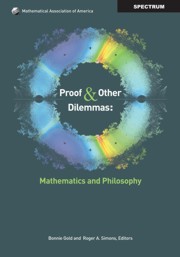Book contents
- Frontmatter
- Contents
- Acknowledgments
- Introduction
- I Proof and How it is Changing
- II Social Constructivist Views of Mathematics
- III The Nature of Mathematical Objects and Mathematical Knowledge
- IV The Nature of Mathematics and its Applications
- 12 Extreme Science: Mathematics as the Science of Relations as Such
- 13 What is Mathematics? A Pedagogical Answer to a Philosophical Question
- 14 What Will Count as Mathematics in 2100?
- 15 Mathematics Applied: The Case of Addition
- 16 Probability—A Philosophical Overview
- Glossary of Common Philosophical Terms
- About the Editors
13 - What is Mathematics? A Pedagogical Answer to a Philosophical Question
from IV - The Nature of Mathematics and its Applications
- Frontmatter
- Contents
- Acknowledgments
- Introduction
- I Proof and How it is Changing
- II Social Constructivist Views of Mathematics
- III The Nature of Mathematical Objects and Mathematical Knowledge
- IV The Nature of Mathematics and its Applications
- 12 Extreme Science: Mathematics as the Science of Relations as Such
- 13 What is Mathematics? A Pedagogical Answer to a Philosophical Question
- 14 What Will Count as Mathematics in 2100?
- 15 Mathematics Applied: The Case of Addition
- 16 Probability—A Philosophical Overview
- Glossary of Common Philosophical Terms
- About the Editors
Summary
From the Editors
We had hoped to have several contributions to this book from people doing research in undergraduate mathematics education, since we believe that one's philosophy of mathematics often has a significant impact on how one teaches mathematics. Unfortunately, several of those we invited either declined or initially accepted and then found themselves too involved in other projects. Fortunately, Guershon Harel does some of the most interesting work in undergraduate mathematics education, although of course he does not represent the whole community. He includes the conceptual tools of mathematics as part of mathematics and hence part of what we must teach along with definitions, theorems and proofs. Those who are involved in teaching undergraduate mathematics are likely to find his chapter worthwhile.
We have one suggestion that we think may help you as you read this chapter. There is a nice parallelism in the language, “ways of thinking,” “ways of understanding,” but the first several times we read the chapter we had difficulty separating in our minds how a way of thinking differs from a way of understanding. We suggested to the author that he replace “ways of understanding,” simply by “understandings” (by which we mean how each of us understands the objects and facts of mathematics). But he was reluctant to do this for reasons he explains in his chapter. As you read the chapter, you may want to mentally drop “ways of ” from “ways of understanding”—at least, this helped us keep the distinction clear between his notions of “ways of thinking” and what we prefer to call “understandings.”
- Type
- Chapter
- Information
- Proof and Other DilemmasMathematics and Philosophy, pp. 265 - 290Publisher: Mathematical Association of AmericaPrint publication year: 2008
- 14
- Cited by



